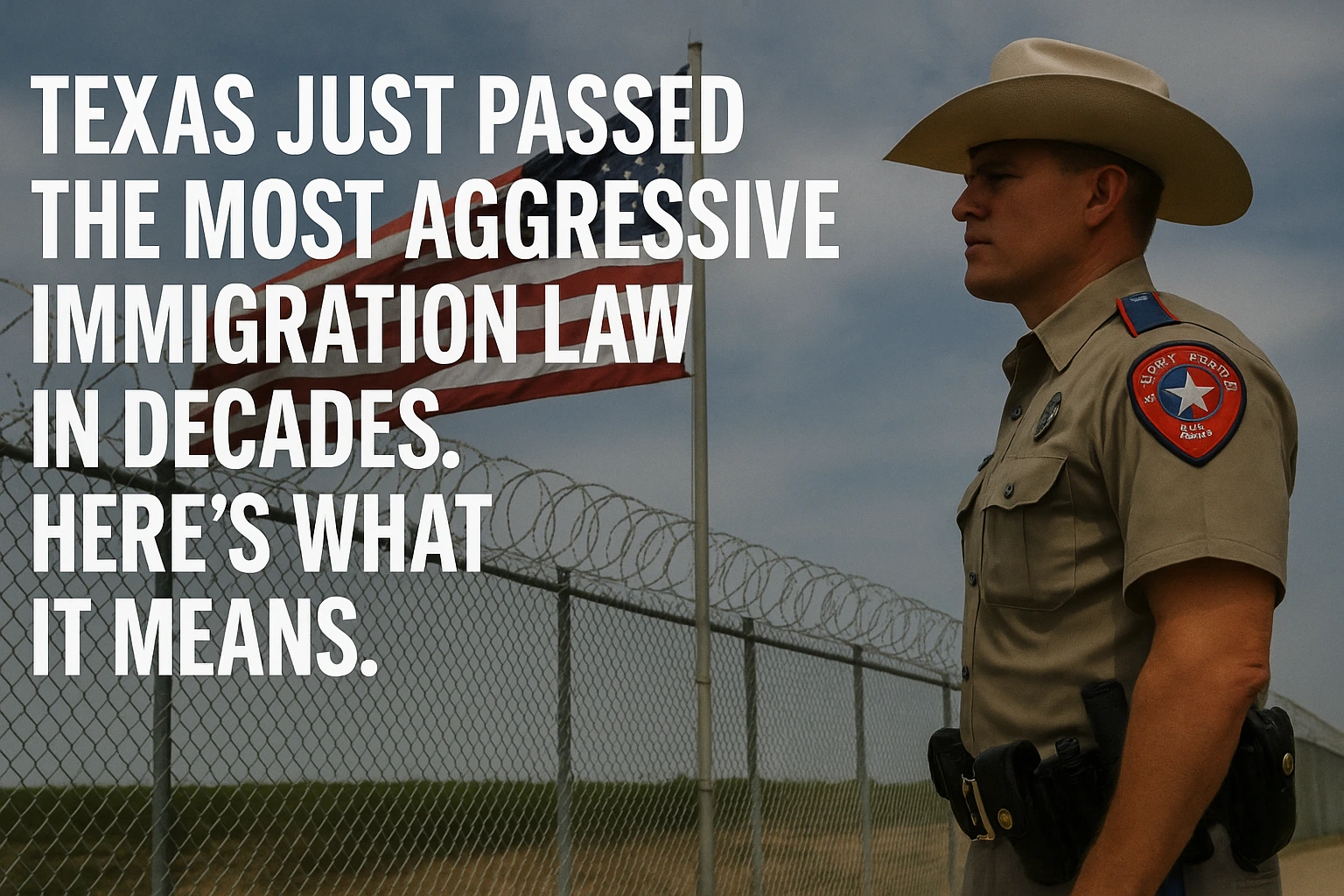Texas just enacted its most sweeping immigration law in decades, giving state police power to arrest migrants and raising constitutional concerns. Here’s what it means and how it could reshape border enforcement in 2025.
Table of Contents
📰 Introduction: Texas Redefines the Immigration Battle
Texas just made history — and not without controversy. In a move that has reignited national debate over immigration, the state passed Senate Bill 11, widely considered the most aggressive immigration law in decades. The new law allows state and local police to arrest undocumented migrants suspected of crossing into the U.S. illegally and even deport them without federal involvement.
With President Trump’s return to the White House in 2025, Republican-led states like Texas have taken more assertive steps on immigration. But this latest law pushes boundaries that experts warn could result in legal showdowns, constitutional challenges, and significant implications for millions of immigrants.
🚨 What the New Texas Immigration Law Does
1. Allows State Arrests for Border Crossings
Texas police can now arrest individuals they suspect of illegally crossing the U.S.-Mexico border. Previously, only federal authorities had this power.
2. Criminal Charges for Unauthorized Entry
Under the new law:
- First-time offenders face a Class B misdemeanor.
- Repeat violations can result in felony charges, carrying up to 2 years in prison.
3. Empowers Texas Judges to Deport Migrants
Texas magistrates now have the authority to order deportations directly to Mexico, bypassing federal immigration courts. This creates a state-run deportation mechanism unlike anything in recent U.S. history.
4. Mandatory Detention
Local jails can detain suspected undocumented migrants until their trial or deportation order is issued, increasing jail overcrowding concerns.
⚖️ Legal and Constitutional Backlash
The law has already triggered lawsuits from civil rights groups, immigration advocates, and even the federal government. Legal experts point out several issues:
- Supremacy Clause Violation: The U.S. Constitution grants immigration authority to the federal government — not the states.
- Due Process Concerns: Fast-track deportations by local judges raise red flags about legal representation and appeals.
- Racial Profiling: Civil rights organizations warn that allowing state police to arrest based on suspicion will lead to racial discrimination against Latino communities.

🇲🇽 Reaction from Mexico
The Mexican government responded strongly, stating it “will not accept deportations by state authorities.” Foreign Minister Alicia Bárcena called the law “a violation of international norms and bilateral agreements.”
Mexico has also hinted at retaliatory measures, including:
- Suspension of cooperative border programs
- Legal appeals through international courts
🧮 Economic Fallout for Texas
Texas has a booming agricultural, construction, and hospitality industry — all of which rely heavily on immigrant labor. According to a 2024 report by the Texas Business Roundtable:
- 1 in 5 workers in Texas is foreign-born.
- The new law could shrink the labor pool by 12% in key industries.
- A statewide labor shortage could lead to higher prices for goods, especially food and construction.
📊 Polls: Texans Are Divided
A recent July 2025 poll from the University of Texas/Texas Tribune found:
- 47% of Texans support the new law.
- 41% oppose it, citing human rights concerns.
- Among Hispanic Texans, 68% disapprove of the law.
🏛️ What Happens Next?
Legal Challenges Are Already Underway
- The ACLU and Southern Poverty Law Center filed suit in federal court.
- The DOJ may step in, arguing Texas has overstepped its constitutional limits.
Implementation Timeline
- The law goes into effect on September 1, 2025, unless blocked by a court injunction.
- Law enforcement agencies are currently undergoing training and legal briefings.
💥 Why This Law Matters Nationwide
1. Could Set Precedent for Other States
If Texas wins its legal battle, expect similar laws in Florida, Arizona, and Georgia.
2. Pushes Boundaries of Federalism
This case could end up in the Supreme Court, reshaping how immigration enforcement is shared between federal and state governments.
3. Could Impact 2026 Midterms
With immigration top of mind for voters, the law may become a defining issue in upcoming elections, especially in border states.
🔍 Expert Opinions
Dr. Linda Chavez, former White House immigration advisor:
“This law is not just aggressive — it’s unprecedented. It blurs the line between federal and state authority in dangerous ways.”
Raul Reyes, immigration attorney:
“We’re entering legally uncharted territory. This could collapse the system of federal immigration courts.”
Sheriff Mike Gonzalez, Hidalgo County:
“We don’t have the manpower to enforce this law effectively. It’s going to drain resources and stretch our jails to the limit.”
📌 What Immigrant Families in Texas Are Saying
In cities like El Paso, McAllen, and Laredo, undocumented families are living in fear. Some are avoiding public services, skipping school registrations, and staying indoors — fearing random encounters with law enforcement.
A Mexican mother of three in San Antonio shared anonymously:
“I’ve lived here for 12 years, working and paying taxes. Now I’m scared to drive my kids to school.”
📎 Summary: What to Watch
| Issue | Status |
|---|---|
| Law Implementation | Sept 1, 2025 |
| Court Challenges | Ongoing |
| Federal Response | Expected |
| Economic Impact | Emerging |
| Migrant Rights | Under Threat |
📘 FAQ: Texas Immigration Law 2025
Q1: Can local police really deport someone under this law?
A: Yes — Texas magistrates can order deportation to Mexico without federal oversight.
Q2: Is this legal under the Constitution?
A: That’s under review. Lawsuits argue it violates the Supremacy Clause and Due Process.
Q3: Will other states pass similar laws?
A: If Texas wins in court, other conservative-led states may follow suit.
Q4: What should immigrants in Texas do now?
A: Seek legal advice, stay informed, and monitor court rulings as the law may be blocked or modified.
Q5: What happens if Mexico refuses deportees?
A: That could create an international standoff and complicate enforcement.
